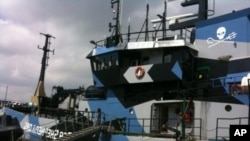Conservationists in Australia say they are willing to risk their lives to stop Japanese whale hunts in the Southern Ocean. Tokyo said earlier this month it would resume its annual hunt in the Antarctic despite international pressure. Australia says it will continue legal action to stop the hunt in the International Court of Justice, while the radical Sea Shepherd organization says it is preparing for violent confrontation in the icy southern waters.
Ultimate sacrifice
The vegan warriors aboard the Sea Shepherd vessel the Bob Barker say they are willing to make the ultimate sacrifice to protect whales from Japanese harpoons in the Southern Ocean.
Crew member Benjamin Potts says his colleagues accept the dangers that lie ahead.
“You are placing your life at risk on these trips and no one wants to die for the whales, but everyone is willing to risk their lives to go down and hopefully save, you know, these species from extinction or from being killed,” said Potts.
Sea Shepherd
Sea Shepherd is based in the United States but launches its campaigns in the Antarctic from Australian ports. This year, the group plans to send three ships to harass the Japanese whaling fleet. In response, Tokyo is warning that its ships will have better security and will be escorted by patrol vessels. Previous clashes have resulted in the sinking of a Sea Shepherd boat and several near misses.
While Sea Shepherd activists have thrown acid stink bombs, it is alleged the whalers have retaliated using high-pressure water hoses and powerful noise weapons that fire high and low frequency sound waves at protestors.
Tactics
Benjamin Potts says that direct action is an effective way to take on the whalers.
“These tactics work," he said. "Going down there and, you know, waving banners or filming what they are doing, while it does get the message out to the rest of the world that this is still happening, it has no real impact. It does not save those whales’ lives. They are still killed.”
Dae Levine from Greenpeace Australia Pacific favors a more diplomatic approach to whaling. And while her organization will not be sending boats to chase the hunters, she believes that its attempts to win the hearts of the Japanese people are slowly working.
“They now see how the government is involved with what is basically a corrupt industry, and it is not just about history, it is not about tradition, it is really about corruption and it is really about money," she said. "And the more that we are able to tell that story, the more that we are able to convince the Japanese people that this is not about the Japanese government upholding any kind of tradition, but it is about them protecting some people lining their pockets, then we are able to convince people and we have seen that change on the ground.”
Bob Barker
But for the crew of the Bob Barker, which is due to leave its base in Sydney Harbor in December, further confrontation with the whaling fleet seems inevitable. Ominously, Sea Shepherd is calling this year's campaign 'Divine Wind', which translates into Japanese as kamikaze.
Dr. Tim Stephens, a specialist in international law at the University of Sydney, believes the group’s methods are questionable.
“On one view it is piracy. It can be construed under some interpretations of the UN Convention on the Law of the Sea as piracy," he said. "My view is that in fact is that it is unlawful interference with a vessel contrary to some of the counter-terrorism conventions that exist to protect vessels, and also fixed installations like oil platforms in the oceans. They are trying to go as close as they can to the edge of the law without overstepping the mark and finding themselves in court for piracy.”
Stopping Japan
The Australian government wants the International Court of Justice to stop Japan from hunting whales, but a final decision could be two or three years away. Unless a negotiated settlement can be worked out in the meantime, it is likely that clashes in the Southern Ocean will intensify.
Commercial whaling has been outlawed for 25 years, but Japan is allowed to catch about 1,000 whales each year in what Tokyo insists is a scientific research program.
Critics say it is commercial whaling in all but name.




